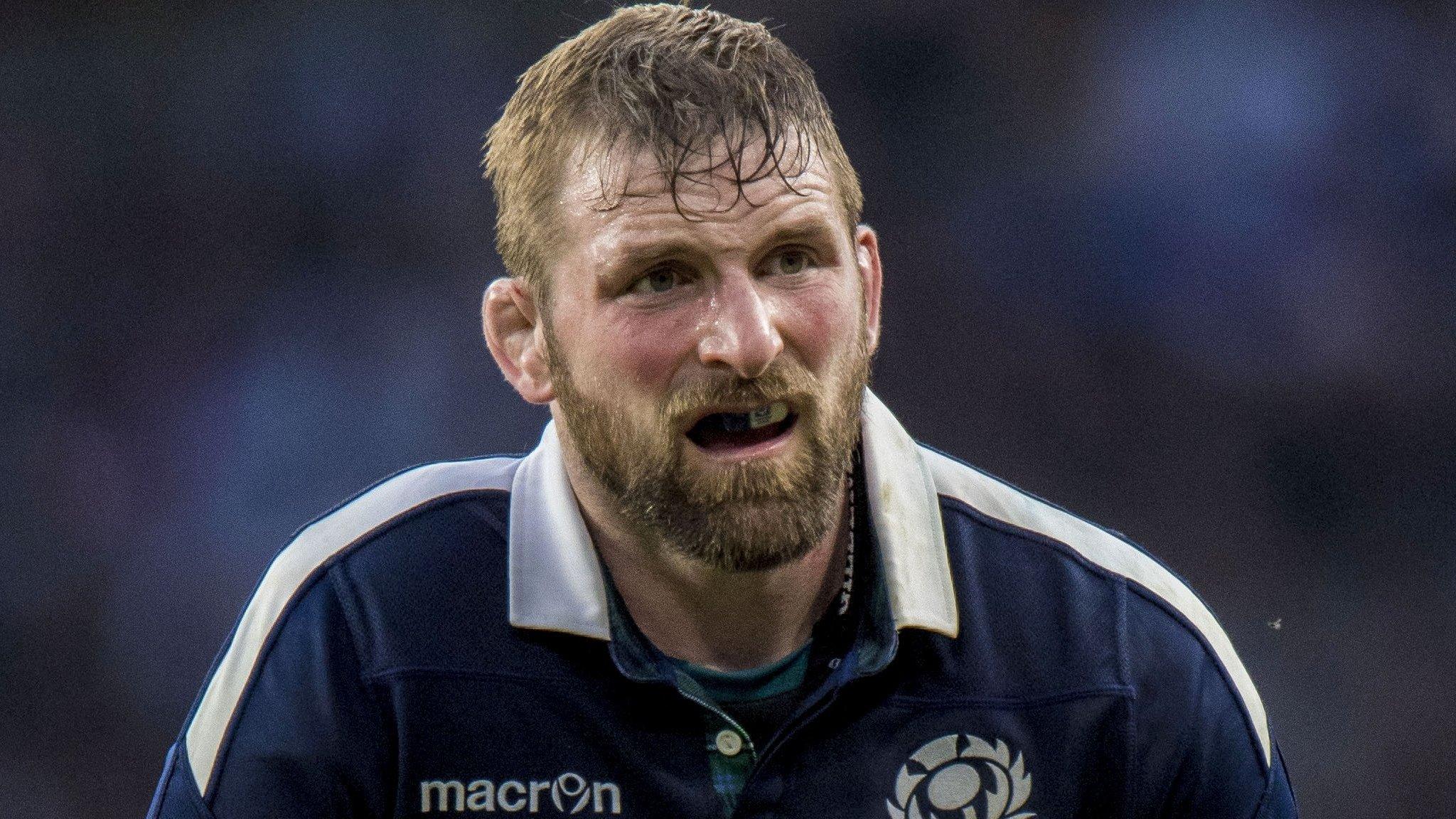The challenges facing Scotland head coach Gregor Townsend
- Published
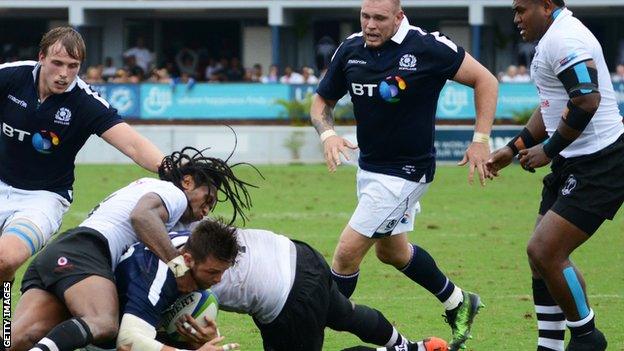
Scotland were unable to complete their summer tour with a third win as they went down 27-22 to Fiji
Scotland exited Suva on Sunday morning amid hugs from the locals and then a police escort which led their bus down the rickety road to Nadi.
A flight to Sydney awaited, then an overnight, then the journey home. Three weeks on tour, six weeks together in total; this has been a long summer already.
It didn't have the end they were looking for. Everything they delivered in Sydney - clinical rugby, extraordinary defence, cool heads under pressure - was cast into the Pacific in Fiji in that 27-22 loss.
In the space of a week, Gregor Townsend saw the twin personalities of his team, their ability to beat most sides when they're on song and their vulnerability against most sides when they're not.
Too many tackles missed - Townsend
It was the first time the Fijians had beaten a tier one nation in a decade. Their power and passion was overwhelming. After the highs of Sydney, it was a sobering lesson, a reminder - not that it should have been needed - that if you miss nearly 30 tackles, regardless of the size of the dumptrucks you're attempting to tackle, you're playing a huge part in your own downfall.
Defence won a Test in Australia and defence helped lose it in Fiji. Scotland were without five of their first-choice backline, but Gregor Townsend has never been a coach to seek refuge in that kind of thing. On his first tour he had two good wins, one awful loss and a whole lot of things to think about going forward.
Cloning Finn
The evidence was already compelling, but Saturday added further ballast to the belief that Scotland can't get by in any meaningful Test unless they have Finn Russell at 10.
The stand-off is their greatest, and most irreplaceable asset, the man who, at his best, brings control and devilment and certainty to those around him.
Gregor Townsend kept his counsel, but he must have been frustrated to see Russell, a late call-up, making up the numbers with the British and Irish Lions in New Zealand instead of making things happen in Suva. In Sydney, Russell was outstanding in attack and defence.
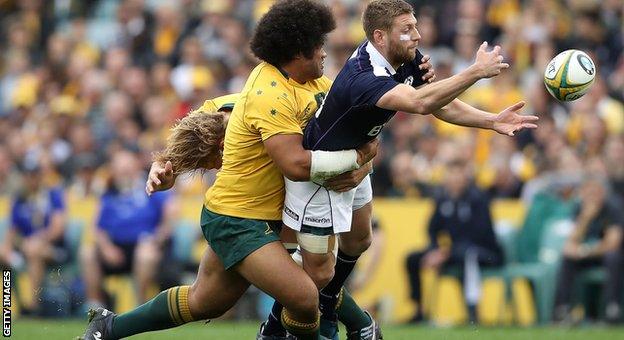
Scotland missed Finn Russell in the final tour match against Fiji. A late call-up to the Lions, he was not in their match-day squad against New Zealand at Eden Park on Saturday
There was a time when you couldn't envisage Scotland doing anything without the brilliance of Stuart Hogg to inspire them, but that's not strictly true now.
Scotland beat the Wallabies with Greig Tonks filling in for Hogg. There isn't another player in the country who could fill in for Russell.
Peter Horne, a centre trying to play 10, started in 2015 against Italy at Murrayfield. Duncan Weir stepped in against South Africa at the World Cup and against Ireland in 2016 and it was Horne, and Ruaridh Jackson, who shared the gig against Fiji.
All those games were lost. Russell would have made a difference in at least two of them.
One of Townsend's gigs over the coming months and years is to invent a machine that can clone Russell. Failing that, he's got to hope that a Conor Eastgate or an Adam Hastings comes roaring through to the senior ranks. There's a dependency on Russell that's not healthy.
Captaincy conundrum
John Barclay was nowhere near his best against Fiji. The fact that he practically had to be rolled out of bed on Saturday morning after suffering a back spasm didn't help. His involvement in the Test was in doubt right until the last minute. He played, but he wasn't himself. This was Barclay's greatest season, but it ended painfully, in every sense.
In the absence of Greig Laidlaw, he's become a fine captain, which begs the question - who captains Scotland in the autumn? It depends on how Townsend answers another question - who plays scrum-half in the autumn? Laidlaw might be the Lion, but, unquestionably, Ali Price has looked the more complete nine in recent months.
People have written Laidlaw off before only for him to come surging back to prominence. This is a critical moment in his Scotland career, though. Barclay can lead and Russell can goal-kick. Those are two of Laidlaw's key strengths. He's got a major challenge on his hands.
Drive on, Jonny
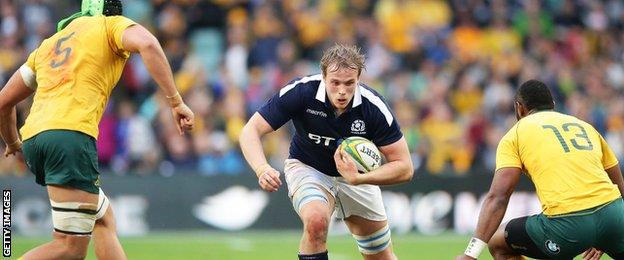
Lock Jonny Gray is highly regarded for the number of tackles he puts in during a match
Jonny Gray remains a tremendous talent, but he needs to move to the next level now. His work-rate will always be phenomenal, but to reach world-class standard - or Lions standard - he needs to add things to his game, he needs to become more influential on days like Saturday, when Scotland are in trouble and need their big players to dig them out of it.
Warren Gatland didn't fancy him for the Lions. He needs to feed off that. He needs to become more physically dominant, more destructive.
He needs to carry. We need to see a lot more of him out there. More dog. He needs to make not just a lot of tackles, but a lot of big tackles.
He doesn't have the offloading brilliance of a Leone Nakarawa or the physical stature of a Maro Itoje, but if he's to kick on and become the player he can be, then now is the time.
Crowded in the middle
The emergence of Ben Toolis at lock was one of the stand-out pluses of the tour. He's a genuine contender for a Six Nations match-day 23 now. The other huge movers were WP Nel and Duncan Taylor, not so much discoveries as rediscoveries after long absences with injury.
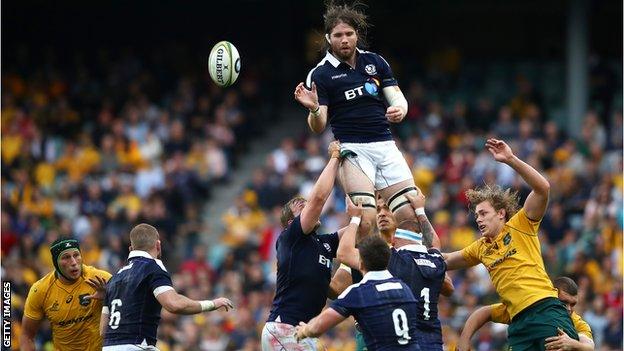
Ben Toolis (top) partnered Jonny Gray in Scotland's second row against Australia
Scotland's options in the midfield are greater than at any point in their history. Taylor may be a scatterbrain, nicknamed Spacey, who turned up at the airport for this tour thinking his driver's licence would be sufficient to get him on the plane, but he's a fantastic rugby player and a hugely important figure for Scotland going forward.
You fancy that he'll play 12 come the autumn and the Six Nations, which leaves the 13 jersey up for grabs between Alex Dunbar, Huw Jones and Matt Scott. Horne is in there, too. Mark Bennett, sadly, is, a long-term injury.
Nick Grigg made his debut in Fiji and, by his own estimation, touched the ball only three or four times. That was an illustration of how badly wrong Scotland got it on the day. Grigg is a smart attacker who was starved of possession.
He deserves another chance, but the competition ahead of him makes you wonder when he's going to get it.
Show Fiji some respect
Before kick-off in Suva on Saturday, nine former Fiji internationals from the 1960s, 1970s and 1980s were brought on to the pitch for a ceremony. Among them: Atonio Racika, a hooker, Nasoni Uluvula, a lock, and Ilami Lutumailagi, an openside flanker.
Back in 1973, Racika had England's John Pullin as his opposite number in a 13-12 loss in Suva. In 1979 Lutumailagi made his debut in front of 20,000 people against Jean-Pierre Rives' France in the same stadium where Scotland were beaten. In 1984 Uluvula jumped against New Zealand's Andy Haden, one of his heroes.
Fiji awarded caps for those games but the English, French and New Zealanders did not. That was the way of it back then. The arrogance of the most powerful rugby nations was untrammelled. They didn't sully themselves by giving out caps for games against the likes of Fiji.
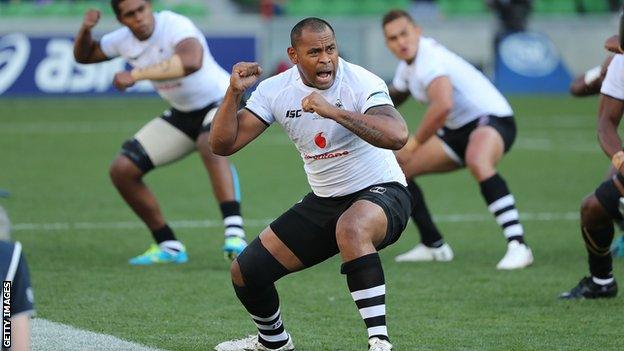
Fiji perform the Cibi, a war dance, before the Test match against the Wallabies in Melbourne on 10 June
This is a continuing disgrace. Apart from sending over non-cap XVs - the last of them 33 years ago - New Zealand don't come to Fiji. They have never played a full Test match in this country despite Fiji being utterly in thrall to All Black rugby.
They are far from alone. France have not darkened Fiji's door in 19 years, but by comparison to others they're heroic explorers. Australia and Wales have not played a Test in Fiji in 23 years. England have not been here in 26 years. Ireland haven't been in 41 years. The Springboks have never been here at all.
A new global calendar kicks in from 2020 and if it is to have any credibility then World Rugby had better ensure that nations like Fiji get some respect. It's long overdue.
Tom English picks his Scotland first XV for the autumn Tests
Stuart Hogg; Tommy Seymour, Huw Jones, Duncan Taylor, Sean Maitland; Finn Russell, Ali Price; Alasdair Dickinson, Fraser Brown, WP Nel; Jonny Gray, Richie Gray; John Barclay, Hamish Watson, Ryan Wilson.
And here's how a second team might look
Greig Tonks; Lee Jones, Matt Scott, Alex Dunbar, Tim Visser; Peter Horne, Greig Laidlaw; Allan Dell, Ross Ford, Zander Fagerson; Tim Swinson, Ben Toolis; Rob Harley, John Hardie, Josh Strauss.
- Published24 June 2017
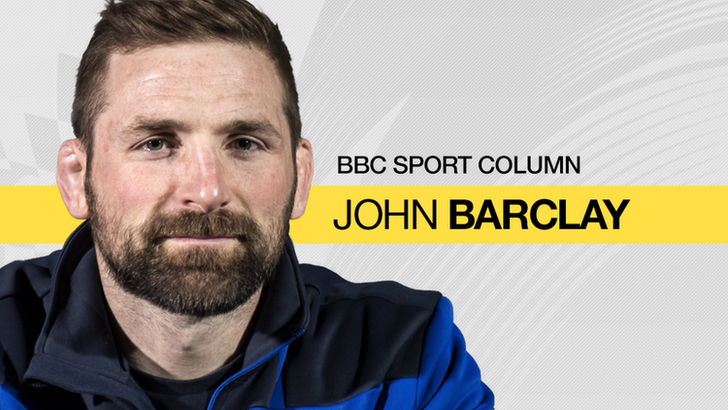
- Published24 June 2017
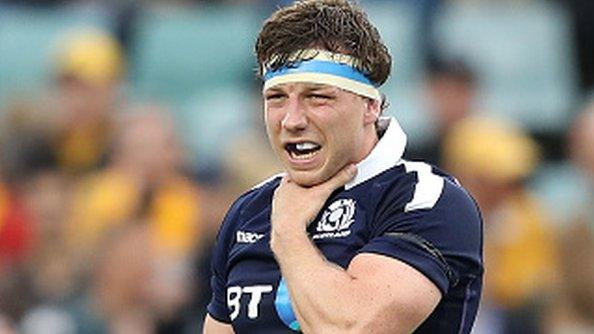
- Published24 June 2017
